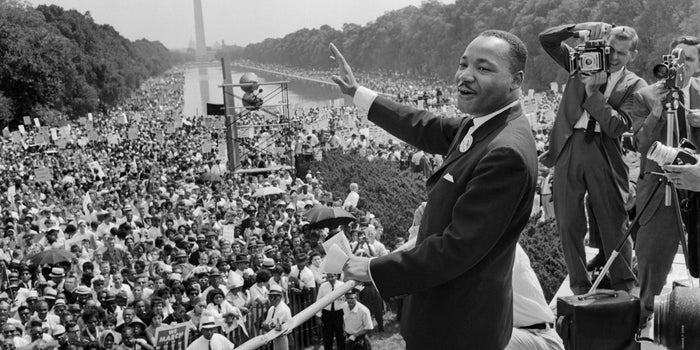Dr. Martin Luther King, Jr.'s Influence Inspires Change and Growth
“The ultimate measure of a man is not where he stands in moments of comfort and convenience, but where he stands at times of challenge and...
There’s no getting around it. Our country has experienced a painful and challenging summer. We’ve been confronted with longstanding issues of race relations and systemic racial injustice. FranFund stands with the Black community and all Americans of color. We hope that our country can grow stronger as we acknowledge these problems and work to fix them, rather than hiding from them or remaining silent.
The issues of inequality and disproportionate police bias against Black Americans hit us close to home last fall, when Atatiana Jefferson was killed in her own home three miles south of our Fort Worth headquarters. Following her death, our CEO Geoff Seiber was moved to engage with our local Black business leaders, with the goal of determining what we can do to help. In his words, “We had to do more.”
Geoff reached out to his Fort Worth Chamber of Commerce colleague Devoyd “Dee” Jennings, who is also President and CEO of the Fort Worth Metropolitan Black Chamber of Commerce (FWMBCC). In Geoff’s words, “We’d only known each other from afar. After Atatiana was killed, we [the Fort Worth Chamber of Commerce] were working on our statement and position. [Dee] spoke to the Chamber and said, ‘Let’s not write another statement and say we’re finished.’ He challenged everybody to do more. I waited until Dee was finished speaking and told him I wanted to take him up on that.”
Geoff and Dee became fast friends over shared interests and values. After several months of lunches and conversations about race relations, they decided Dee would speak with our company about diversity and inclusion.
Like the rest of the country, we were horrified by the May killing of George Floyd, and as we were subsequently reminded of similar killings of Black Americans nationwide. The ensuing protests have brought this issue back to the forefront of national consciousness, which made our town hall with Dee timelier than we could have anticipated.
We had the pleasure of virtually meeting with Dee last month. His insight was invaluable, as both a longtime business leader and a Black American who lived through the Civil Rights Movement. We had a frank and open discussion about the barriers facing the Black community, as well as things we can do to improve, both as individuals and as an organization. It was an uncomfortable and very emotional conversation at times. And that’s a good thing. As Dee reminded us, “We won’t make progress if we stay in our comfort zones. This is the only way to get things started.”
Our discussion spanned personal and business issues. We spoke about the conversations Black parents are forced to have with their teenage children about surviving routine traffic stops. We spoke about the uneasiness many Black businesspeople feel at events where they’re the only faces of color. We spoke about how many people of color lack the access to form relationships with people who are socioeconomically different from themselves.
In Dee’s words, “It’s hard for some of us to want to even come to certain business events once we’re invited. Some of us have never been invited before. And when we get there, people are likely to sit with people they know, who they already see all the time. That’s not progress.”
One of the worst consequences of this disconnect is disparate access to capital. This affects communities of color in many facets of life, business among them. It is one of the biggest hurdles facing minority entrepreneurs; although segregation is no longer public policy, many Americans of color are still excluded due to lack of resources. Per Dee’s analogy, “People can check into the hotels now, but they might not be able to check out.”
Despite all of these barriers, our country has many Black-owned business today, spanning all industries. Black entrepreneurs have been particularly successful in the franchising space. However, lower average access to capital has contributed to Black-owned businesses being hit disproportionately hard by the pandemic and recession. Per a recent report from the New York Federal Reserve, Black-owned small businesses have been nearly twice as likely to shutter as other firms. These gaps are unacceptable. This is particularly personal and troubling for us, as a provider and administrator of small business funding solutions.

It is important to recognize that the fight for equality is not over. These past few months have highlighted how far we still have to go. As Dee expressed in our town hall, “We’re still fighting the same battles we fought 40 years ago. It’s important to get more soldiers on the field, so we aren’t having these same conversations 40 years from now.” Perhaps the most important takeaway from our conversation with Dee was that we need to start by having these conversations, even if it makes us uncomfortable. That is the only way forward.
We have added Inclusive to our company’s core values, in order to keep it at the forefront of everything we do and to help guide our culture. Our next step has been taking the time to actively listen. We are currently working on actionable steps to better support communities of color. This includes engaging in DEI training and participating in conversations with members of the Black community to better understand their perspectives.
African American entrepreneurs comprise one of the fastest-growing groups of franchisees in the country. As funding providers in this space, we are in a position to champion these aspiring business owners and provide the resources they need to help make their dreams of business ownership a reality. While we bolster our support to the Black community, our journey toward DEI continues. We vow to take part in breaking down equity barriers, so opportunities for sustainable prosperity exist for everyone.

“The ultimate measure of a man is not where he stands in moments of comfort and convenience, but where he stands at times of challenge and...

During the month of February, we celebrate Black History Month. All of us are well aware of the significant contributions made to our society by the...

“Faith is taking the first step even when you can't see the whole staircase." - Dr. Martin Luther King, Jr. On Martin Luther King Jr. Day, which...
